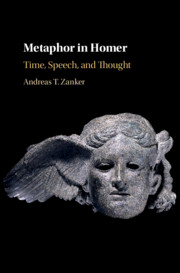
-
Select format
-
- Publisher:
- Cambridge University Press
- Publication date:
- July 2019
- August 2019
- ISBN:
- 9781108649162
- 9781108491884
- Dimensions:
- (228 x 152 mm)
- Weight & Pages:
- 0.54kg, 272 Pages
- Dimensions:
- Weight & Pages:
You may already have access via personal or institutional login
Book description
How are time, speech, and thought presented in the Iliad and Odyssey? What role does metaphor play in these portrayals? How might metaphor have aided the poet in the production of his song? In this book, Andreas T. Zanker considers these and other questions from the perspective of conceptual metaphor theory, investigating the commonalities and differences between the ancient and modern conceptualizations of, for example, the passing of time, communication of information, and internal dialogue. In so doing, he takes a stance on broader questions concerning the alleged 'primitive' quality of the Homeric conceptual system, the process of composition in performance, and the categories of the literal and the figurative. All Greek is translated, and readers in disciplines beyond classics and cognitive linguistics will find something of interest in this investigation of the conceptual metaphors lodged within a corpus of extremely early poetry.
Reviews
‘This excellent, timely, and lucidly written book, the first monograph to explore the significance of conceptual metaphor theory in any ancient literary corpus, stands at the cutting edge of contemporary classical studies. Zanker's careful and comprehensive account of Homeric metaphors for time, speech, mind, and selfhood will immediately establish itself as a landmark study in the field.'
Douglas Cairns - University of Edinburgh
‘Zanker intervenes in a long-standing debate on the supposed ‘primitiveness' of Homer. His insightful study of metaphor in Homer argues that early epic ideas about time, the mind, and speech are more in line with the modern conception (though without fully coinciding with it) than was previously thought. Refreshing work!'
Egbert Bakker - Yale University, Connecticut
Contents
Metrics
Altmetric attention score
Full text views
Full text views help Loading metrics...
Loading metrics...
* Views captured on Cambridge Core between #date#. This data will be updated every 24 hours.
Usage data cannot currently be displayed.
Accessibility standard: Unknown
Why this information is here
This section outlines the accessibility features of this content - including support for screen readers, full keyboard navigation and high-contrast display options. This may not be relevant for you.
Accessibility Information
Accessibility compliance for the PDF of this book is currently unknown and may be updated in the future.


